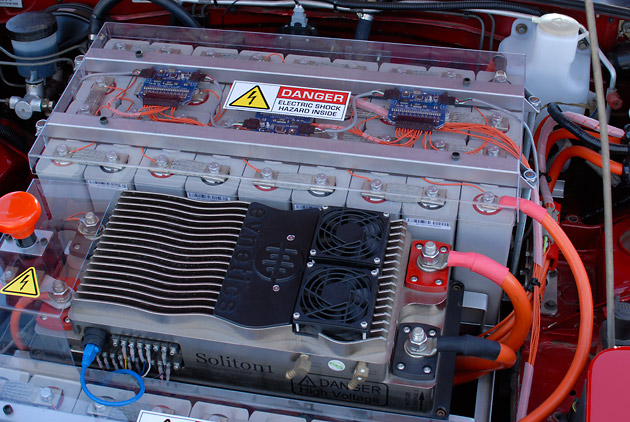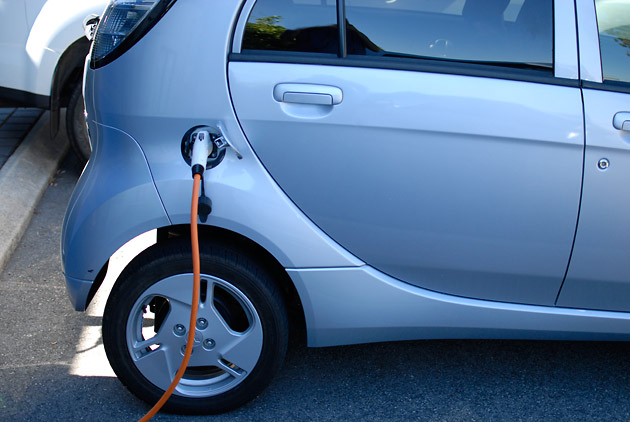18 April, 2017 By: Kerith Sharkey
Electric cars are known for their quietness, smooth driving and zero tailpipe emissions. Need more convincing? We investigate five common myths about electric cars.
However, questions continue to circulate around the performance of EVs compared to their traditional, petrol-fuelled counterparts, or if they’re really that great for the environment.
We’ve gone fact-checking to investigate five common assumptions about electric vehicles.
Myth 1 - Electric cars have a limited battery range
Range is the distance an EV can travel on a single charge, and yes, the range of some electric cars is shorter than their petrol and diesel-powered equivalents, however the gap is closing.
Chevrolet, Nissan, Tesla, Hyundai, Renault and some Chinese car makers are working on relatively affordable small electric cars with improved battery range.
Already many models have range that allows for significant travel.
For example, the Nissan Leaf’s 30kWh battery has a 250km range, about the distance from Perth to Dunsborough, although this model is not currently available in Australia. The next generation Nissan Leaf – expected to hit our shores in 2018, is expected to have a charge range of 550km.
The (not cheap) Tesla Model S can travel up to 500km from a single charge, depending on the model.
Given the Australian Bureau of Statistics says that Australian cars travel an average of 13,800km per year, or just 38km per day, for large swathes of the urban population, even current battery range would suffice.
Myth 2 - Electric car batteries aren't covered by warranty
Most electric car batteries are covered by warranties. However warranty periods and kilometre limits do vary between brands and models. For example, Tesla offers an eight year limited warranty on its batteries.
Electric car batteries degrade over time and usually need to be replaced at some stage, which can cost more than $10,000 depending on the make and model of the car. It pays to do your homework before purchasing.
Myth 3 - Electric car batteries are toxic and cause pollution
Many electric vehicle batteries are made from environmentally friendly lithium-ion and are not toxic. They all contain small amounts of cobalt. These rare metals allow for light and efficient batteries.
Extracting rare metals requires mining and it’s an energy intensive process.

Secondly, to extract the cobalt the mined earth is put through several acid baths, which leaves a fairly toxic residue. More needs to be done to improve the process of mining rare metals to ensure it’s done more sustainably, fairly and safely.
On the plus side, since EV batteries contain valuable materials, they are more likely to be recycled than end up in landfill.
Tesla’s Gigafactory, under construction in the Nevada desert, will have an on-site recycling facility to reprocess old batteries for re-use in new batteries.
Enjoying this article?
Sign up to our monthly enews
Myth 4 - Manufacturing an electric car consumes more energy than regular vehicles
Car manufacturing is an energy-intensive process, whether the vehicles are electric, liquid-fuelled or a combination of the two, such as hybrid vehicles.
It is true that electric or hybrid vehicles currently require more energy to manufacture than petrol or diesel-fuelled cars.
However, studies have found the higher amounts of energy required to manufacture EVs and hybrids are typically offset by their much lower emissions during their useful life.Myth 5 - Electric cars aren’t really green – the ‘long tailpipe theory’
The long tailpipe theory is a common argument against the environmental friendliness of electric cars.
Its claim is that charging up your car with power from fossil-fuel electricity sources is just as bad as the pollution and global warming emissions that once came from exhaust pipes.

Even tapping into the grid is becoming more sustainable. In WA, just over 7 per cent of energy generated is from renewable sources and is growing every year.
However, renewable energy sources or not, a study in the US by the Union of Concerned Scientists found that although renewably sourced power gave greater benefits, even in US regions with less eco-friendly electricity production, “driving an [electric vehicle] in any region of the [USA] produces less global warming pollution than the average new gasoline car."
So all up, EVs are not emissions free. However, given the current benefits plus the technological improvements and innovation pouring into the space, they remain our more environmentally and user-friendly future.
Image credit: Clayton Jauncey
We believe EVs are the answer to creating a more sustainable future. To make it easier for those who choose to go electric, we launched the RAC Electric Highway®, giving you a network of trusted charging stations that will take you from Perth to Augusta and back.
Considering an EV? Get a discount on your car loan interest rate.
Get 0.50% p.a. off your car loan interest rate when you buy an electric vehicle.
T&Cs: Discount applies to fully electric new and used vehicles, excludes Hybrid vehicles. Offer is subject to RAC Finance Lending Terms and Conditions. Fees and charges apply. Australian Credit Licence 387972.
Enjoy this story? Get more of the same delivered to your inbox. Sign up to For the Better eNews.
